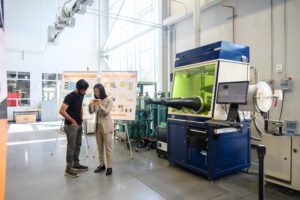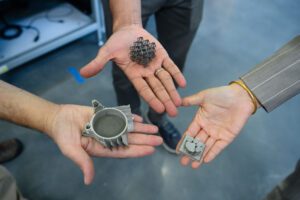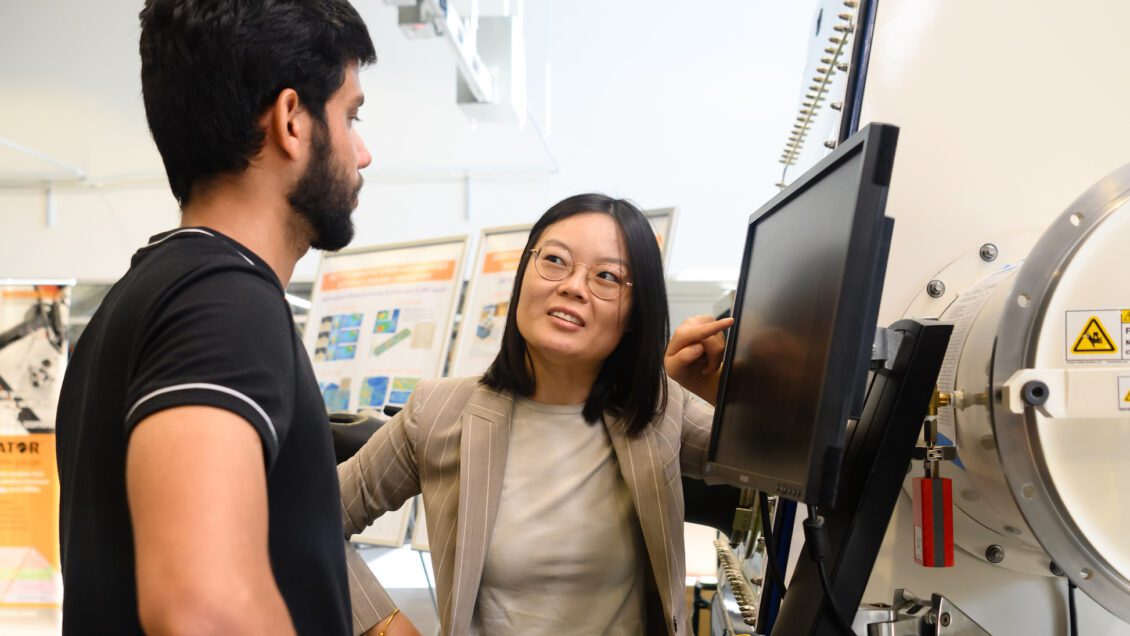The work that Clemson University’s Shunyu Liu is doing at the intersection of materials science and automotive engineering is helping advance additive manufacturing and could help turbocharge the U.S. manufacturing sector.
As an assistant professor of automotive engineering, Liu is a rising star in the world of 3D-printing. She and her team aim to make metal parts stronger and without flaws.

By using computer simulations and real-world tests, Liu is shaping the future of how industries manufacture and use metal parts while molding the next generation of manufacturing leadership.
“Additive manufacturing is a disruptive technology– a game changer,” she said. “We know there are limitations. That’s why we are here– to push the boundaries of this technology. Hybrid additive manufacturing is the next stage.”
Som Dixit, a third-year Ph.D. student who aspires to a career in industry, said that when he was searching for an advisor he was drawn to Liu because of her enthusiasm and the large number of times her work has been cited by other researchers.
“Also, she was working in the field of additive manufacturing, and this is a very hot topic to do research because there is so much left to be discovered,” Dixit said. “She is very involved in my research when I am working with her, and she provides a lot of timely input.”
Dixit is helping Liu push the boundaries of manufacturing technology. In a new project, they are developing what the team is calling HI-RAM, an acronym for “hybrid in-situ rolled additive manufacturing.”
HI-RAM builds objects layer by layer like other types of 3-D printing but uses synchronous hot rolling during the printing of each track and layer. It makes the final metal piece tougher and stronger, which is more suitable for structural applications.
Liu sees high promise for HI-RAM.
“With HI-RAM, we’re working to craft high-performance structural parts that can transform how industries view 3D-printed metal components,” she said. “This innovation has strong potential to firmly position the United States at the forefront of global manufacturing.”

Two cornerstones of the South Carolina economy, the automotive and aerospace industries, are among the sectors that would stand to benefit, she said.
The Liu group is conducting its research with funding from a National Science Foundation CAREER award. As part of the grant, Liu is collaborating with colleges, high schools, local manufacturers and manufacturing organizations to offer professional HI-RAM training aimed at motivating and preparing a high-quality manufacturing workforce.
Liu will be bringing to the curriculum a passion for additive manufacturing that goes back a decade when she studied laser cladding, a related field, as a master’s student.
She went on to receive her Ph.D. in mechanical engineering from Purdue University, where she had the opportunity to conduct research in laser-additive manufacturing.
Liu joined Clemson in 2021 as an assistant professor based at the Clemson University International Center for Automotive Engineering (CU-ICAR) in Greenville. She and her students work with 3D printers at the neighboring Center for Manufacturing Innovation, a Greenville Technical College facility where Clemson has lab space.
Liu said that when she was close to the end of her Ph.D. program, she was asked if she preferred to go into a mechanical engineering or a materials science department.
She chose neither and carved her own path.
“I selected automotive engineering at CU-ICAR,” Liu said. “This position is for manufacturing and materials and fits my expertise very well.”
Get in touch and we will connect you with the author or another expert.
Or email us at news@clemson.edu

